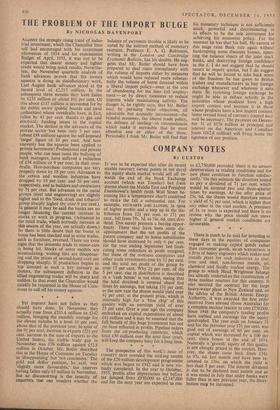THE PROBLEM OF THE IMPORT BULGE
By NICHOLAS DAVENPORT AGAINST the strongly rising trend of indus- trial investment, which the Chancellor him- self had encouraged with his investment allowances of 1954 and his expansionist Budget of April, 1955, it was not to be expected that dearer money and tighter credit would bring quick results. Neverthe- less, the November quarterly analysis of bank advances proves that the money squeeze is doing its disinflationary work. Last August bank advances stood at the record level of £2,215 million. In the subsequent three months they have fallen by £235 million or about 10+ per cent. Of this about £137 million is accounted for by the public sector (public boards and local authorities) whose overdrafts have, in fact, fallen by 45 per cent. thanks to gas and electricity funding issues in the capital market. The decline in the advances of the private sector has been only 5 per cent. (about £98 million) against the self-imposed target' figure of 10 per cent. And how unevenly has the squeeze been applied to private borrowers!, Professional and private people, who can least resist the bullying of bank managers, have suffered a reduction of £34 million or 9 per cent. in their over- drafts. Hire-purchase companies are very properly down by 18 per cent. Advances to the cotton and woollen industries have dropped by 19 per cent. and 26 per cent. respectively, and to builders and contractors by 74 per cent. But advances to the metal groups (steel and engineering) are slightly higher and to the 'food, drink and tobacco' group sharply higher (by over 9 per cent.). In general it may be said the banks are no longer financing the current increase in stocks or work in progress. (Advances to the retail trade, which normally increase at this season of the year, are actually down.) So there is little doubt that the boom at home has been checked and in some trades, such as furniture, reversed. There are even signs that the domestic trade in motor-cars is being hit. Stocks of some models are accumulating, waiting lists are disappear- , ing and, the prices of second-hand cars are dropping sharply. If production begins to top demand in such a key industry as motors, the subsequent deflation in the allied engineering trades will be sharp and sudden. In that event the Chancellor would quickly be requested in the House of Com- mons to call off his money squeeze.
Yet imports have not fallen as they should have done. In November they actually rose from £333.4 million to £342 million, bringing the monthly average for the eleven months to a level 16 per cent. above that of the previous year. In spite of the 9i per cent. increase in exports (221 per cent. increase in the case of exports to the United States), the visible trade gap in November was £70 million against £52.8 million in October. Mr. Butler described this in the House of Commons on Tuesday as 'disappointing' but 'not conclusive.' The gold and dollar position, he said, was 'slightly more favourable,' the reserves having fallen only £5 million in November. But so disconcerting is the tenacity of importers that one wonders whether the balance of payments trouble is likely to be cured by the indirect method of monetary restraint. Professor E. A. G. Robinson, 'writing in the London and Cambridge Economic Bulletin, has his doubts. He sug- gests that Mr. Butler should have been prepared to deal more immediately with the volume of imports either by measures which would have reduced more substan- tially the volume of home demand within a liberal import policy—even at the cost of abandoning for the time full 'employ- ment or by direct measures to reduce' imports while maintaining activity. The danger is, he rightly says, that Mr. Butler may he pursuing three objectives, all admirable but mutually inconsistent—the brimful economy, the liberal trade policy, the defence of sterling—in circumstances which make it inevitable that he must abandon one or other of the three. Personally I think Mr. Butler will find that his monetary technique is not sufficiently quick, powerful and discriminating in its effects to be the sole instrument for achieving his economic policy. For the moment he has shot his bolt. He cannot at this stage raise Bank rate again without bankrupting some discount houses, upset- ting the balance sheets of the joint stock banks, and destroying foreign confidence in the L. I do not suggest that he should return to import quotas, but I do suggest that he will be forced to take back some of the freedom he has given to British traders and manufacturers to. buy foreign exchange whenever and wherever it suits them. By rationing foreign exchange he 'might be able to reduce activity in the industries whose products have a high import content and increase it in those whose pro5luets have a low import content. Some revised form of currency control ma y well he necessary. The payment on Decem- ber 31 of $176 million in principal and interest on the American and Canadian loans (£62.8 million) will bring home the tightness of our position.


































 Previous page
Previous page